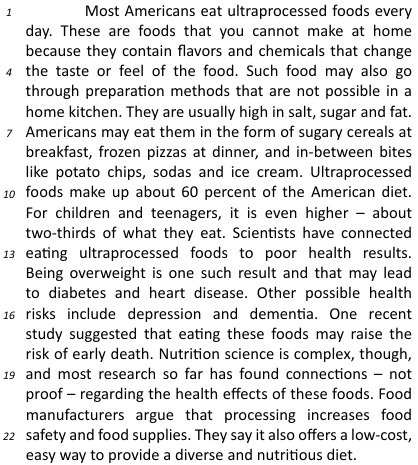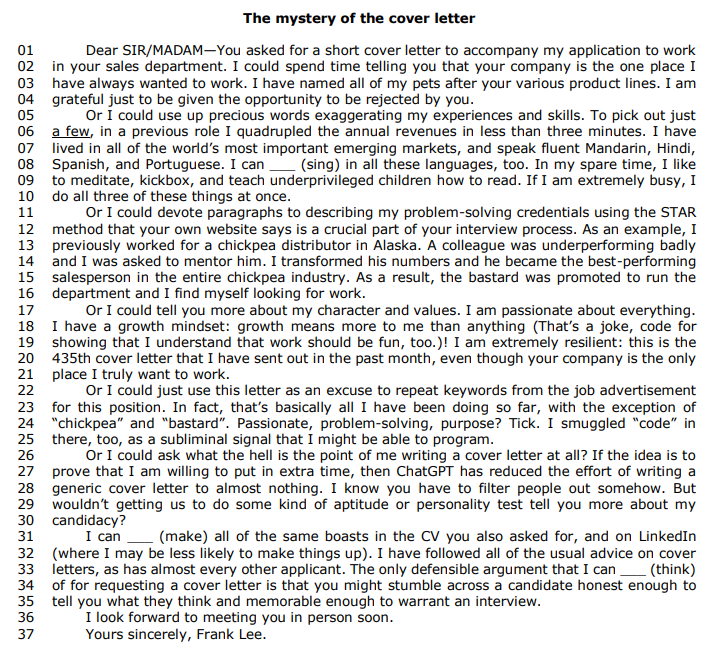Questões de Concurso
Sobre presente perfeito | present perfect em inglês
Foram encontradas 180 questões
READ TEXT I AND ANSWER THE FIVE QUESTION THAT FOLLOW IT
TEXT I
National Assessment Reform: Core Considerations for Brazil
Education has been an integral part of Brazil’s success story. With expanded access to basic education and improvements in literacy rates, young Brazilians are entering today’s workforce with higher levels of education than previous generations. This educational progress has contributed to and benefited from the economic growth that helped improve living standards and, during the first decade of the millennium, lifted more than 29 million people out of poverty. Trend data from the OECD Programme for International Student Assessment (PISA) reveal that Brazil’s increasing school participation rates have been realised alongside progress in education quality. This is a remarkable achievement considering that many of the new students progressing through the education system come from disadvantaged backgrounds and often lack the socio-economic support that helps enable learning. Nevertheless, PISA also reveals that the overall performance of Brazil’s education system is well below the OECD average and other emerging economies, such as parts of China and the Russian Federation. One reason for this is Brazil’s high share of students who do not achieve baseline proficiency, or Level 2 in PISA. Results from PISA 2018 show that 50% of Brazilian students failed to reach Level 2 in reading, meaning they can only complete basic tasks. Brazil’s share of low-performers was even higher in Mathematics and Science (68% and 55%, respectively). At the other end of the spectrum, few students in Brazil were able to answer more difficult PISA questions, like inferring neutrality or bias in a text, which require skills that are increasingly important in today’s world. The new approach to education, set out in the BNCC, aims not only to ensure that all students achieve basic cognitive skills but also develop the higher-order skills needed to solve complex problems of everyday life.
Adapted from: https://www.oecd-ilibrary.org/docserver/333a6e20- en.pdf?expires=1728831657&id=id&accname=guest&checksum=CD292865CAA9F4B A019D2FE4378B5D2D
From it we have learned most of what we know. Recently, we have waded a little out to sea, enough to dampen our toes or, at most, wet our ankles.

1. Present Simple 2. Past Simple 3. Present Perfect 4. Past Perfect
( )"Sweden became the first nation outside Africa to report a case of the newer strain." (Lines 10-11)
( ) "Cases of other strains, or clades, of mpox have popped up in other countries." (Line 12)
( ) "The outbreak involves a newer strain primarily seen in African countries." (Line 1)
( ) "… in neighboring countries that had never reported countries of mpox before." (Lines 8-9)
The correct order of the numbers, from top to bottom, is:

I. “Had not met” is a negative structure in the past perfect tense.
II. “Have happened” is a present perfect structure.
III. This is a conditional sentence.
Which statements are correct?
Instruction: answer the question based on the following text.
HBO posts casting call for next-generation Harry Potter TV series
By Vivian Ho

(Available at: www.theguardian.com/books/article/2024/sep/10/hbo-posts-casting-call-for-nextgeneration-harry-potter-tv-series – text especially adapted for this test)
I. She has been working here since five years. II. I have already completed the assignment. III. They have gone to the supermarket. IV. He has lived in London for three years.
Analyze strips I, II and II below:
I.

II.

III.

What verb tenses are in strips I, II and III, respectively?
Analyze strips I, II and II below:


What verb tenses are in strips I, II and III, respectively?

Based on the information provided in the text and your knowledge of English grammar, judge the item below.
The sentence “Scientists have connected eating ultraprocessed foods to poor health results” is written in the present perfect tense.
Check the sentences below:
I- She’s been sleeping.
II- She’s being tested.
III- She’s just finished her meeting.
What is the ’s a contraction of in each sentence, RESPECTIVELY?

(Available at: https://www.economist.com/business/2024/09/05/the-mystery-of-the-cover-letter – text specially adapted for this test).
TEXT 1
Why is music good for the brain?
October 7, 2020
By Andrew E. Budson, MD, Editorial Advisory Board Member, Harvard Health Publishing

1. Can music really affect your well-being, learning, cognitive function, quality of life, and even happiness? Hand in a recent survey on music and brain health conducted by AARP revealed some interesting findings about the impact of music on cognitive and emotional well-being: music listeners had higher scores for mental well-being and slightly reduced levels of anxiety and depression compared to people overall.
2. Of survey respondents who currently go to musical performances, 69% rated their brain health as “excellent” or “very good,” compared to 58% for those who went in the past and 52% for those who never attended. Of those who reported often being exposed to music as a child, 68% rated their ability to learn new things as “excellent” or “very good,” compared to 50% of those who were not exposed to music.
3. Active musical engagement, including those over age 50, was associated with higher rates of happiness and good cognitive function. Adults with no early music exposure but who currently engage in some music appreciation show above average mental well-being scores. Those are pretty impressive results, to be sure. However, this 20-minute online survey has some limitations. For one, it included 3,185 US adults ages 18 and older; that is a small number if you are extrapolating to 328 million people across the country. For another, it is really a survey of people’s opinions. For example, although people might report their brain health as “excellent,” there was no objective measure of brain health such as an MRI scan, or even a test to measure their cognition.
4. Lastly, even if the ratings were true, the findings are only correlations. They do not prove that, for example, it was the exposure to music as a child that led to one’s improved ability to learn new things. It may be equally likely that those children brought up in more affluent households were both more likely to be exposed to music and to be given a good education that led to their being able to easily learn new things later in life.
5. Music has been shown to activate some of the broadest and most diverse networks of the brain. Of course, music activates the auditory cortex in the temporal lobes close to your ears, but that’s just the beginning. The parts of the brain involved in emotion are not only activated during emotional music, they are also synchronized. Music also activates a variety of memory regions. And, interestingly, music activates the motor system. In fact, it has been theorized that it is the activation of the brain’s motor system that allows us to pick out the beat of the music even before we start tapping our foot to it!
6. Okay, get along! so music activates just about all of the brain. Why is that so important? Well, have you ever heard the expression, “If you don’t use it, you’ll lose it”? It turns out this is actually true in the brain. Brain pathways — and even whole networks — are strengthened when they are used and are weakened when they are not used. The reason is that the brain is efficient; it isn’t going to bother keeping a brain pathway strong when it hasn’t been used in many years. The brain will use the neurons in that pathway for something else. These types of changes should be intuitively obvious to you — that’s why it is harder to speak that foreign language if you haven’t used it in 20 years; many of the old pathways have degraded and the neurons are being used for other purposes.
BUDSON, Andrew E. Why is music good for the brain? Harvard Health Publishing, 7 out. 2020. Disponível em: